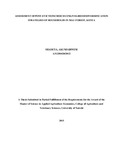Assessment of post-eviction choices on livelihood diversification strategies of households in Mau forest, Kenya

View/
Date
2015Author
Shadeya, Akundabweni
Type
ThesisLanguage
enMetadata
Show full item recordAbstract
Conservation of natural resources is vital to ensure that there is sustainable use. Natural resources are important in the contribution of the livelihoods of rural households. Globally eviction has been one of the conservation efforts. However, the conservation of natural resources has not been achieved sustainably due to the neglect effect it has on livelihoods. Thus the research focus was aimed at understanding how the effect of eviction with its levels of displacement influenced the alternative choice sets of livelihood strategies in Nakuru County, Njoro Division. Njoro division in Nakuru County is located in the Eastern Mau block which is one of the eight blocks of the Mau forest. The study also characterized the livelihood strategies of households and analyzed the household attribute determinants that influence the selection of a strategy. Using the Negative Binomial regression model, the study analyzed data collected from a sample of 364 households. The sampling technique used was the purposive sampling and random systematic technique whereas the sample determination was by use of the Cochran formulae. The study found out that households were either evicted or non-evicted. Evicted households were categorized into 3 displacement levels: economically and physically displaced, physically displaced and economically displaced accounting for 86%, 3% and 11% respectively. Study findings showed that a household size; being a victim of eviction; physical displacement and both economical and physical displacement; wealth; income; distance to a primary school and distance to an input source were determinants that influenced a livelihood strategy.Results also indicated that households diversified both in off farm and on farm activities. The outcome of this study provides insights of how ongoing efforts to achieve double sustainability by balancing conservation with livelihoods in Kenya. There is need to ensure that eviction policies align with the determinants of household livelihood strategies. The study recommends: interventions targeting large households should enable them to diversify from natural resources dependence strategies to non-farm; substitution between assets and activities should be in place with a well-functioning market to allow for livelihood resilience; implementations aimed at facilitating widening of income options will enhance households diversifying to reduce potential risks; infrastructural constraints should be dealt with selectively through improvement of access; displacement policy should engage on resettlement, monetary compensation and recovery. Conservation should prevent economic destitution of victims. Key words: Eviction, levels of eviction, households and diversification
Publisher
University of Nairobi
